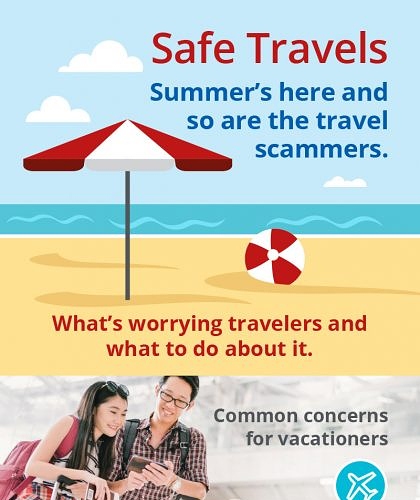
With summertime just around the corner, families are eagerly looking to book their next getaway. Since vacation is so top-of-mind during the summer months, users are bound to come across websites offering cheap deals on flights, accommodations, and other experiences and activities. With so many websites claiming to offer these “can’t-miss deals,” how do you know who to trust?
It turns out that this is a common concern among folks looking for a little summer getaway. According to our recent survey of 8,000 people across the UK, US, Canada, Australia, France, Germany, Spain, and Singapore, 54% of respondents worry about their identity being stolen while booking and purchasing travel and accommodation online. However, 27% don’t check the authenticity of a website before booking their vacation online. Over half of these respondents say that it doesn’t cross their minds to do so.
These so-called “great deals” can be difficult to pass up. Unfortunately, 30% of respondents have been defrauded thanks to holiday travel deals that were just too good to be true. What’s more, 46.3% of these victims didn’t realize they had been ripped off until they arrived at their holiday rental to find that the booking wasn’t actually valid.
In addition to avoiding bogus bookings, users should also refrain from risky online behavior while enjoying their summer holidays. According to our survey, 44.5% of respondents are putting themselves at risk while traveling by not checking the security of their internet connection or willingly connecting to an unsecured network. 61% also stated that they never use a VPN, while 22% don’t know what a VPN is.
Unfortunately, travel-related attacks aren’t limited to just travelers either; hotels are popular targets for cybercriminals. According to analysis conducted by the McAfee Advanced Threat Research team, the most popular attack vectors are POS malware and account hijacking. Due to these attacks, eager vacationers have had their customer payment, credit card data, and personally identifiable information stolen. In order for users to enjoy a worry-free vacation this summer, it’s important that they are aware of the potential cyberthreats involved when booking their trips online and what they can do to prevent them.
We here at McAfee are working to help inform users of the risks they face when booking through unsecured or unreliable websites as well as when they’re enjoying some summertime R&R. Check out the following tips so you can enjoy your vacation without questioning the status of your cybersecurity:
- Always connect with caution. If you need to conduct transactions on a public Wi-Fi connection, use a virtual private network (VPN) to help keep your connection secure.
- Think before you click. Often times, cybercriminals use phishing emails or fake sites to lure consumers into clicking links for products or services that could lead to malware. If you receive an email asking you to click on a link with a suspicious URL, it’s best to avoid interacting with the message altogether.
- Browse with security protection. Use a comprehensive security solution, like McAfee Total Protection, which includes McAfee WebAdvisor that can help identify malicious websites.
- Utilize an identity theft solution. With all this personal data floating around online, it’s important to stay aware of any attempts to steal your identity. Use an identity theft solution, such as McAfee Identity Theft Protection, that can help protect personally identifiable information from identity theft and fraud.
And, as always, to stay updated on all of the latest consumer and mobile security threats, follow @McAfee_Home on Twitter, listen to our podcast Hackable?, and ‘Like’ us on Facebook.
The post Bargain or Bogus Booking? Learn How to Securely Plan Summer Travel appeared first on McAfee Blogs.
Article Link: https://securingtomorrow.mcafee.com/consumer/consumer-threat-notices/safe-summer-travels/
